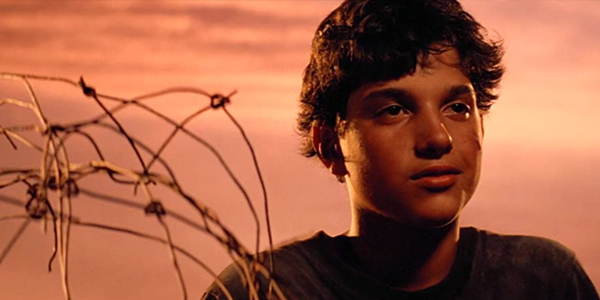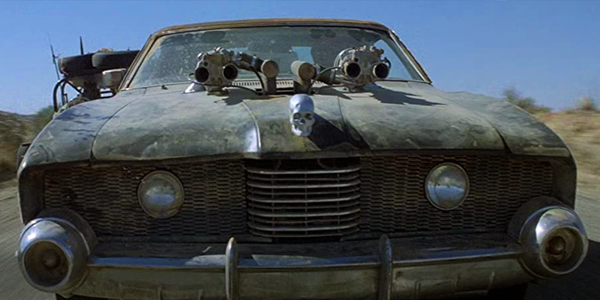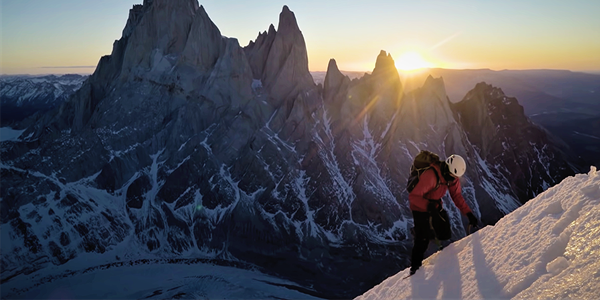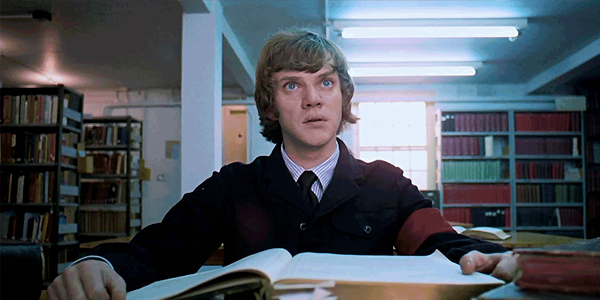
review | Dune (2021)
This latest adaptation of the Frank Herbert classic easily eclipses all of the earlier attempts
by Dennis Burger
October 22, 2021
Let’s set aside for a moment the question of whether Denis Villeneuve’s Dune works as a partial adaptation of Frank Herbert’s classic science-fiction novel. With something in the neighborhood of 20 million copies sold, the book is one of the best-selling of its genre. But divide those sales figures by the world population and chances are very good most people who view the film will have never cracked the cover of this gargantuan doorstop of a tome. So a much more relevant question is whether or not Dune works as cinema on its own terms.
And thankfully that ends up being the much easier question to answer. Yes—a thousand times, yes. As if he hadn’t proven it already with films like Arrival, Prisoners, and Blade Runner 2049, Villeneuve demonstrates with Dune that he understands cinema as an art form in a way few other modern directors do.
As with most of his work, Villeneuve straddles two worlds with Dune, keeping one foot firmly planted in the traditions of the past and one foot precariously placed in an uncharted future. By that I mean that despite looking very much like a 21st-century film, it doesn’t feel like one. There’s something quite old-fashioned about it, or perhaps “timeless” is the word I’m looking for. The allusions to Lawrence of Arabia are blatant—and fitting, given how much that film influenced Frank Herbert in the writing of Dune. But Villeneuve manages to draw inspiration without aping. He evokes the spirit, scope, and energy of David Lean’s classic without being beholden to its style. The style is entirely Villeneuve’s.
Well, cinematographer Greig Fraser (Zero Dark Thirty, The Mandalorian) also deserves a lot of credit for the style. While I said that Dune looks like a 21st-century film, that’s not quite accurate. It simply looks like a film that couldn’t have been captured before the modern era of filmmaking. Ultimately, it looks unlike anything I’ve ever seen. And that may have something to do with the unusual postproduction process. The movie was shot on a mix of IMAX film and ArriRaw digital (the latter at 4.5K resolution), but before the footage was finished in a 4K DI, all of the digital imagery was printed to film stock then scanned back to into the computer.
That gives the imagery a unique character, to say the least. It doesn’t look entirely analog but neither does it look wholly digital. It’s the best of both methods—which, again, reinforces the notion of Dune as the perfect marriage of tried-and-true past and untested, experimental future.
That captivating aesthetic, combined with the sheer scale of the film and its reliance on capturing as much as possible in camera (to the point that, in promotional interviews, actor Timothée Chalamet claims to recall only seeing a green screen twice during production) adds up to a film that demands to be seen at scale, on the best screen you can reasonably access. In my case, that meant watching HBO Max’s stream in my own home cinema system since the nearest commercial cinema that can legitimately claim to deliver a better audiovisual experience is a three-hour drive away in Alpharetta, GA.
Thankfully, shockingly, the HBO Max presentation is the very definition of reference-quality. I started my stream the minute the film was available, which struck me as a foolhardy choice the instant I hit Play, given how many millions of other people must have been sitting with their fingers on their remotes, waiting for it to be unlocked. But I never experienced any glitches due to server overload and I never spotted anything in the image that could be construed as an artifact of the high-efficiency encoding of the film.
Far from it. I would go so far as to say I’ve never experienced imagery this captivating, engaging, or dynamic in my media room. Part of that is due to the sumptuous detail, the gorgeous textures, the unparalleled set design, costumes, etc. But a lot of it has to be chalked up to the fact that Dune represents the most effective application of high dynamic range grading I’ve seen to date.
HBO Max’s Dolby Vision presentation pushed my display to extremes I didn’t know it was capable of, extremes I can’t imagine being bested by anything other than perhaps a perfectly calibrated IMAX Laser setup—and I have my doubts about even that. Simply put, if displays had rights, Dune would be a violation of the Geneva Conventions.
But none of its visual extremes—scenes bathed in near-infinite shadows followed quickly by such dazzling brightness that your pupils will constrict to pinpoints—feels gratuitous. All are absolutely in service of the story and the environments in which it unfolds.
Equally compelling is the Dolby Atmos soundtrack, which is likewise so dynamic that I pity the unfortunate souls who attempt to experience it through a soundbar or basic home theater speaker setup. If you’re an Atmos junkie who keeps a mental running tally of how frequently your surround and overhead speakers—and subwoofers—are pushed to their limits, you’re going to be in absolute aural heaven here.
As I’ve stated many times within the pages of Cineluxe, I’m not one of those people. I find most Atmos sound mixes masochistic and overbearing, not to mention distracting. But for Dune, this approach simply works. That may be because the imagery is so captivating that no amount of offscreen audio could pull my attention away from the screen, but I also think it’s due to thoughtful mixing and a deep understanding of the relationship between picture and sound. Whatever the reason, it all simply works, and there’s not much else to say about the sound.
Well, there is one more thing, although I do run the risk of angering some readers here, especially fans of composer Hans Zimmer. I’ve rarely if ever understood the appeal of most of Zimmer’s work. I often find his compositions fatiguing, uninteresting, and so utterly and needlessly aggressive that I need to wipe the testosterone residue from my speakers after watching a film he’s scored. And make no mistake here: his score for Dune is bombastic at times, what with its heavy reliance on percussion and synths.
But this is unquestionably his best score since 1994’s The Lion King, and it succeeds for most of the same reasons. Zimmer understood the assignment here, and his music works in conjunction with the visuals and the narrative in such a way that they’re inseparable. I’ve had the score on repeat throughout the writing of this review, simply because I cannot shake it. It haunts me. Its leitmotifs—both melodic and percussion—resonate with me in a way that few Zimmer scores ever have. And most tellingly, as I’m listening to it, I can close my eyes and see the accompanying moments from the film. And this is a film I’ve only seen once, mind you. That’s the mark of a great score.
Put it all together, and I have next to nothing critical to say about Dune as a work of cinema in and of itself. There are a few edits in the first act that feel a bit choppy. By that I mean that even if you’re completely unfamiliar with the story you’ll no doubt sense that much of what was excised from the assembly cut to get the film down to a tight 2 hours and 38 minutes was removed from the first third.
There’s also the fact that, while the bulk of the performances are truly world-class, Dave Bautista feels out of place here. I’m a fan of Bautista’s, but his portrayal of Rabban Harkonnen—the nephew of the baron who previously ruled the desert planet that gives Dune its name—feels one-note and over-the-top, at least when compared with the nuanced performances turned in by literally everyone else. Other than those quibbles, Dune is a monumental work of art in its own right.
But what about its effectiveness as an adaptation of the supposedly unfilmable novel? Well, it’s not perfect in that respect but it’s infinitely better than I could ever hoped for. Villeneuve—unlike David Lynch and John Harrison (who directed the 2000 mini-series)—has boiled the narrative down to its essence rather than haphazardly and erratically chopping the story into bit-sized pieces. He was able to distill that essence because he understands that essence.
Dune works as a novel because of its complexity. In writing the book, Herbert explored the many ways in which ecology influences and drives every aspect of the human experience, from the personal to the familial to the societal, political, and religious institutions that shape our lives. It’s also a novel that takes place largely between the ears of its characters, something no film could successfully replicate (although, bless his heart, David Lynch tried and failed spectacularly to do so).
With his film adaptation of the first two-thirds or thereabouts of the novel, Villeneuve had no choice but to tidy up some of its tangled narrative threads, and he made the wise choice to focus on the personal and familial above all else. The Dune geek in me laments the de-emphasis on the ecological and environmental. But the cinephile in me can’t imagine how he could have possibly explored that aspect of the novel entirely without turning his film into a never-ending barrage of exposition dumps.
Then again, there’s a lot about this adaptation I never could have imagined before seeing it. There are aspects of the novel I never expected to see translated to the screen, much less this effectively or artfully.
And the fact that Villeneuve managed to capture so much of the book’s essential fiber without creating a big pile of confusion for the uninitiated is a bit of a miracle. After the credits rolled, my wife—who has never read the novel and before now had no interest in doing so—turned to me and said, “I expected to be lost, but I never was. There’s so much more I want to know, so many questions I want answered. But in the moment, watching the film, I didn’t feel like I was missing anything. Well, except for the fact that I feel like there’s a reason why Duke Leto never married Lady Jessica and I wish the film had explored that.”
And in that respect, she’s absolutely correct. Armed with my deep knowledge of the book, I also feel like there are a couple other things the film could have conveyed better, such as the ritualistic obsession with moisture inherent to the culture of the Fremen—the nomadic natives of the planet Arrakis, aka “Dune.” But when I quizzed my wife about it, her response was, “No, I definitely picked up on that.” So, perhaps I’m wrong.
At any rate, now that I’ve experienced the first part of Villeneuve’s intended two-part adaptation, I still have no clue how he’s going to successfully translate the rest of the book to the screen. The rest of the story takes a turn for the weird, to put it lightly. But even if Dune: Part Two ends up being a major flop (assuming it even gets made, although that seems likely), that won’t diminish my appreciation of this first part.
The narrative may not be complete. As Zendaya’s character Chani cheekily teases just before the credits roll, “This is only the beginning.” But Dune nonetheless manages to feel like a complete story, with an ending that is both emotionally and thematically satisfying, while also pointing toward a much bigger and tantalizing future.
Dennis Burger is an avid Star Wars scholar, Tolkien fanatic, and Corvette enthusiast who somehow also manages to find time for technological passions including high-end audio, home automation, and video gaming. He lives in the armpit of Alabama with his wife Bethany and their four-legged child Bruno, a 75-pound American Staffordshire Terrier who thinks he’s a Pomeranian.
PICTURE | The HBO Max presentation is the very definition of reference-quality, with the most effective application of high dynamic range grading to date.
SOUND | The Dolby Atmos soundtrack is so dynamic that you can only pity the unfortunate souls who attempt to experience it through a soundbar or basic home theater speaker setup.
© 2025 Cineluxe LLC





